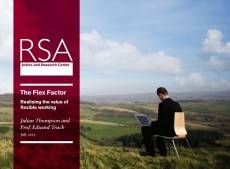May 21, 2014
Homeworking has environmental benefits, says Carbon Trust
There have been some doubts cast recently on the environmental benefits of flexible working. At the recent ThinkFM conference, Lord Rupert Redesdale, the CEO Energy Managers Association said that keeping buildings open for longer to accommodate flexible workers could become unfeasible for many businesses. But what if you simply increase the numbers of home workers instead? Homeworking reduces employee commuting, resulting in carbon, money and time savings. If office space is properly rationalised to reflect this, homeworking can also significantly reduce office energy consumption and rental costs. This is according to new research from the Carbon Trust, which found that if adopted and encouraged by employers across the country, homeworking could result in annual savings of over 3 million tonnes of carbon and cut costs by £3 billion.




























May 9, 2014
Flexible working benefits are undermined by short sighted employers
by Pam Loch • Comment, Flexible working, Legal news, Workplace
There has been a growing perception that flexible working practices are now commonplace in the workplace. However a recent report from Working Families, a charity set up to help working parents and carers find a balance between their responsibilities at work and at home, suggests this is a myth. Their report reflects growing concerns based on experiences and queries from their helpline that employers are in fact, becoming more rigid. The report suggests that working parents are coming under increasing pressure to give up their flexible working arrangements. It highlights “a growing number of callers to the helpline reporting the family-friendly working pattern they have had in place for years being changed or withdrawn virtually overnight, with no opportunity for them to express their views”. Ironically, despite the Government’s championing of flexible working it seems the imposition of employment tribunal claim fees could be behind the backlash. (more…)